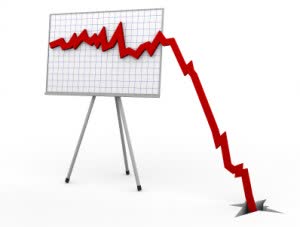Dividend Value Builder Newsletter
Stock Market Crash: Is Your Asset Allocation Right?
If we have a stock market crash, is your asset allocation right to protect your portfolio from large losses? Many investors mistakenly believe that because they are “long term investors” they shouldn’t concern themselves with “short term” returns. They are wrong!
Getting your asset allocation right should be the highest priority of your portfolio risk management strategies.
Stock Market Crashes
Stock market crashes and secular bear markets are a reality of investing in stocks. The result of either will be determined by your investment decisions. If you are not prepared by having the right asset allocation for the current circumstances and valuation; your portfolio can be destroyed for years to come.
If you have a 50% loss and a 50% gain you are not at break even. You have lost 25% of your portfolio! Volatility is one of the most underestimated killers of portfolio performance. If you don’t have a clear understanding of this concept read my post “Portfolio Volatility and the Impact on Performance”.
Get Your Asset Allocation Right!
Once you understand the importance of capital preservation; how do you get your asset allocation right? This is the secret only value investors seem to know: Price Matters!
The public has been taught by the financial media to choose a fixed asset allocation. But does this make sense? Should you buy the same amount of an asset when its price is expensive as when the price is a bargain?
Purchasing investment assets at prices below their fundamental or intrinsic value greatly improves the probability of above average returns. When you require a margin of safety you have created a margin for errors in your analysis, or unforeseen events that could affect your investment.
This means you can lower your investment risk by implementing an adaptive asset allocation. You should never have an asset allocation that can wreck your portfolio for years to come. That may mean being less aggressive than you have been in the past. It also may mean putting more emphasis on cash in your portfolio.
Watch For Warning Signs
Watch for warning signs long before a stock market crash. Investment analysis of individual company valuations and current market valuations should provide warnings of over valued securities. If you can’t find many stocks that meet your margin of safety requirement, that is a warning sign.
Also pay attention to sentiment indicators. Keep in mind the public usually hates stocks when they are bargains and loves them when they are over valued. Be a contrarian thinker when it comes to getting your asset allocation right.
You now have several investment concepts to help you avoid the next stock market crash. There are always warning signs; remember, price matters.
It’s critical to limit losses in a stock market crash because you can grow your capital from a higher base. Then, when most are panic selling you will be buying at prices you know favor above average returns.
Related Reading:
34 Investment Strategies and Rules To Make You A Better Investor
Minimize Large Portfolio Drawdowns
Invest With Confidence in Less Time - Manage Your Portfolio Without Behavioral Errors

